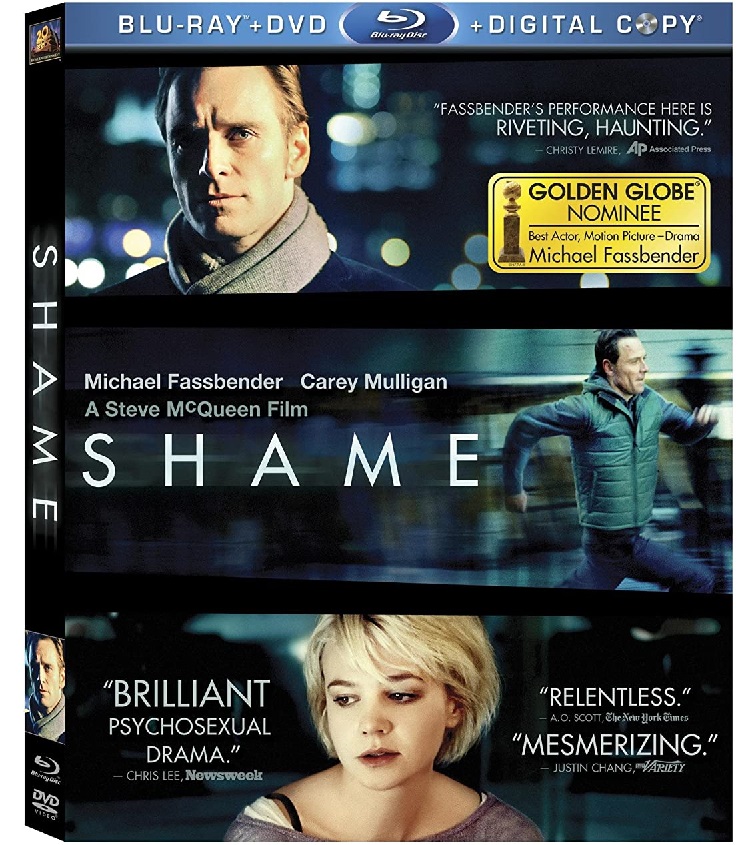
Early in Shame, the hypersexual new film from British director Steve McQueen, the protagonist wordlessly flirts with a pretty passenger on a crowded New York City subway train. It’s the hottest sequence in the film — ironic, considering that it’s one of the only scenes of romantic pursuit that doesn’t end in sweaty, graphic, MPAA-rating-be-damned sex.
Brandon (Michael Fassbender) is a handsome, thirty-something, urban professional (do we still call them Yuppies?) with a taste for the ladies and an aversion to commitment. He spends most of his waking hours in the relentless pursuit of all the intimacy-free sex the Big Apple has to offer: high-paid escorts; streaming broadband peepshows; drunken, dark alley trysts; anonymous fetish club fucking and hush-hush hotel room hook-ups with co-workers.
In a word, he’s a horndog, with the movie star magnetism of Michael Fassbender to seal the deal. That means lots and lots of sex for Brandon, and lots and lots of titillation for the audience.
But there’s also a backstory, lest this be just another pay cable soft-core. Brandon’s troubled sister, a bleach-blonde blues singer named Sissy (Carey Mulligan), shows up (sort-of) unannounced at his swanky midtown apartment and proceeds to take a shower just long enough for Brandon to walk in on her. There follows an awkward family reunion involving a frontally nude sister and her fully clothed, sex-addicted brother. Yeesh.
McQueen never implicitly acknowledges that the siblings have some sort of physically inappropriate history, but he sure does everything he can to imply it, over and over again. In addition to her curtains-don’t-match-the-carpet conversation, Sissy also has loud, jealousy-inducing sex with Brandon’s boss (in Brandon’s bed), spoons her brother (also in his bed) and wrestles with him while he’s wrapped in a towel, which, of course, falls to the floor as he lies on top of her.
These depraved flirtations lead to all manner of self-destruction for both siblings, while simultaneously screaming “motivation!” to the viewer.
And this is my issue with an otherwise really, really good film. Why did McQueen have to bang us (sorry, I couldn’t help myself) over the head so frequently with this icky piece of character development? It could have been so much more understated, and still so effective, even envelope-pushing.
In every other sense Shame is the work of a remarkably assured filmmaker. Throughout the film McQueen relies on long takes and single set-ups that might engender cowardly second-guessing in a less-confident director. He shoots a few crucial scenes entirely from behind, denying us eye contact with Mulligan and Fassbender, contributing to the sense of voyeurism that pervades the film. And he elicits truly moving performances from his two leads (and Nicole Beharie, as the colleague who tries to tame Brandon).
As the physically strong but emotionally weak hero, Michael Fassbender gives the kind of performance that would be a lock for an Oscar nomination if we didn’t see quite so much of his package. He careens through the film with a haunted, hollow-eyed smirk, chugging Red Bull and sniffing coke, engaging in some of the most unpleasant looking cinematic sex since David Lynch’s Twin Peaks: Fire Walk with Me.
Mulligan, inexplicably under-used in the otherwise-terrific Drive, delivers a powerful performance as the unstable singer carrying a torch for the wrong man. She navigates perfectly the complex landscape of emotional imbalance, from girlish giggles to mournful tears, often in the same scene. The sequence in which she performs a bluesy, understated version of “New York, New York” says more about her character than any heavy-handed exposition could ever hope to.
That Fassbender and Mulligan have unmistakable erotic chemistry only heightens my feeling that their characters’ unspoken past could have remained a bit more unspoken, without losing any narrative impact. But I’ll stop harping now.
With some minor tweaks, Shame could have been a dirty love letter to urban loneliness and damaged sexuality. Instead, I fear, it will be dismissed as prurient and exploitive, the latest trite talking point about the coarsening of the culture. I hope I’m wrong.